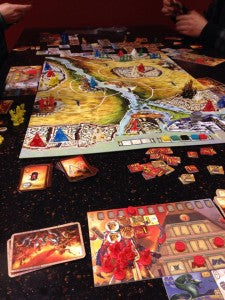Board Game Review - A Godly Evening with Kemet
 I am not a fan of war games. Maybe in an alternate universe I am, but there's something about direct conflict, coupled with a lot of dice-throwing that really puts me off. It's like the randomness of the dice becomes an artificial indication of your inferiority in relation to your opponent. Plus the distinct lack of control over your situation.
It's one of those things. Or maybe both.
I played Star Wars: X-Wing Miniatures recently and that was pretty all right, I suppose, though mainly because of the interesting mechanic of restricted hidden movement. But I could see how, if I could get past the randomness and the huge financial wall, I could enjoy war games due to the infinite possibilities of point buys and army-building. I think I feel the same way about Magic: The Gathering. I would never invest so much money into playing a game, but I can understand how people could find deck-building extremely fun.
Anyway, Kemet isn't really a war game, so I don't know where I'm going with all of this. On its surface, it looks like a war game, with its units and territories and tech trees, but it is fooling you, much like the trickster cat god.
I am not a fan of war games. Maybe in an alternate universe I am, but there's something about direct conflict, coupled with a lot of dice-throwing that really puts me off. It's like the randomness of the dice becomes an artificial indication of your inferiority in relation to your opponent. Plus the distinct lack of control over your situation.
It's one of those things. Or maybe both.
I played Star Wars: X-Wing Miniatures recently and that was pretty all right, I suppose, though mainly because of the interesting mechanic of restricted hidden movement. But I could see how, if I could get past the randomness and the huge financial wall, I could enjoy war games due to the infinite possibilities of point buys and army-building. I think I feel the same way about Magic: The Gathering. I would never invest so much money into playing a game, but I can understand how people could find deck-building extremely fun.
Anyway, Kemet isn't really a war game, so I don't know where I'm going with all of this. On its surface, it looks like a war game, with its units and territories and tech trees, but it is fooling you, much like the trickster cat god.
 And if you approach it like war game, you will lose before you even know what's going on. You start concentrating on taking over your opponent's city, and suddenly he's won with no armies on the board by buying a bunch of points from the gods. It's great.
So, right, you do have units and territories, but the goal of the game is simply to get to 8 victory points, which doesn't necessarily involve destroying your opponent. Admittedly, the main way to get a victory point is to attack one of your opponents' troops and win, but winning isn't the same as killing all of his units - you just have to have a better battle value. In fact, if you don't kill all of his troops and he runs away, you can just attack him again on your next action and get another victory point. At that point, he will probably wise up to the situation and realize the type of game he is playing, because now you are two points ahead and he may not have even lost any troops.
Also, you can get points for controlling temples and sacrificing your troops to the gods. Or by upgrading your pyramids and buying specific power tiles in the tech tree. Everything you do costs prayer points, though, so it's also important to maintain a good prayer economy through power tiles, controlling temples and praying to the gods as an action.
So here's the thing - troops are cheap and there's only one kind. All they do is give you another battle point in a fight, and you can only have 5 of them on a space. Also, you can spend prayer points to teleport a troop from your city to pretty much anywhere you want on the map. You can't turtle up in a couple temples and hope to win because your opponents can attack you at any time without warning.
So it's just a numbers game. When you get into a fight, you play one of six battle cards that could have 1 to 4 battle value on it, then add that to your troop number and any other bonus you have (from divine intervention cards and power tiles). There's no randomness, so you can more or less reason who is going to win in a fight. So if someone left 3 units hanging out in a temple and you've got 5 units ready to teleport on top of them, then, yeah, you're going to win and your opponent probably made a mistake leaving them there and giving you a free victory point.
It's all about being opportunistic and taking points when available in a mad dash to get to 8, and in that sense, it's a lot more like Settlers of Catan than Axis and Allies. Except so much better than both of them. There is so much cool stuff going on in this game that all works together seamlessly. I haven't even mentioned the awesome giant beasts you can get through power cards to mow down your opponents - short version: they're the best.
If I had a complaint, it would be that the informational buy-in for the game is quite large. Like I said, there is a lot going on, and the first time you play it, you're probably not going to do so great because it takes a while to see how all the moving parts actually work together to create the seamless whole. And there's, like, 48 power cards that you have access to from your very first turn, and if you don't have a good grasp on those and how they work together to make powerful combos, then you're not going to do well against someone who does.
But it is so worth that buy-in. Play the game, and then play it again once you understand the grand design. And then maybe play it some more because it's great.
And if you approach it like war game, you will lose before you even know what's going on. You start concentrating on taking over your opponent's city, and suddenly he's won with no armies on the board by buying a bunch of points from the gods. It's great.
So, right, you do have units and territories, but the goal of the game is simply to get to 8 victory points, which doesn't necessarily involve destroying your opponent. Admittedly, the main way to get a victory point is to attack one of your opponents' troops and win, but winning isn't the same as killing all of his units - you just have to have a better battle value. In fact, if you don't kill all of his troops and he runs away, you can just attack him again on your next action and get another victory point. At that point, he will probably wise up to the situation and realize the type of game he is playing, because now you are two points ahead and he may not have even lost any troops.
Also, you can get points for controlling temples and sacrificing your troops to the gods. Or by upgrading your pyramids and buying specific power tiles in the tech tree. Everything you do costs prayer points, though, so it's also important to maintain a good prayer economy through power tiles, controlling temples and praying to the gods as an action.
So here's the thing - troops are cheap and there's only one kind. All they do is give you another battle point in a fight, and you can only have 5 of them on a space. Also, you can spend prayer points to teleport a troop from your city to pretty much anywhere you want on the map. You can't turtle up in a couple temples and hope to win because your opponents can attack you at any time without warning.
So it's just a numbers game. When you get into a fight, you play one of six battle cards that could have 1 to 4 battle value on it, then add that to your troop number and any other bonus you have (from divine intervention cards and power tiles). There's no randomness, so you can more or less reason who is going to win in a fight. So if someone left 3 units hanging out in a temple and you've got 5 units ready to teleport on top of them, then, yeah, you're going to win and your opponent probably made a mistake leaving them there and giving you a free victory point.
It's all about being opportunistic and taking points when available in a mad dash to get to 8, and in that sense, it's a lot more like Settlers of Catan than Axis and Allies. Except so much better than both of them. There is so much cool stuff going on in this game that all works together seamlessly. I haven't even mentioned the awesome giant beasts you can get through power cards to mow down your opponents - short version: they're the best.
If I had a complaint, it would be that the informational buy-in for the game is quite large. Like I said, there is a lot going on, and the first time you play it, you're probably not going to do so great because it takes a while to see how all the moving parts actually work together to create the seamless whole. And there's, like, 48 power cards that you have access to from your very first turn, and if you don't have a good grasp on those and how they work together to make powerful combos, then you're not going to do well against someone who does.
But it is so worth that buy-in. Play the game, and then play it again once you understand the grand design. And then maybe play it some more because it's great.
Leave a comment
Comments will be approved before showing up.





